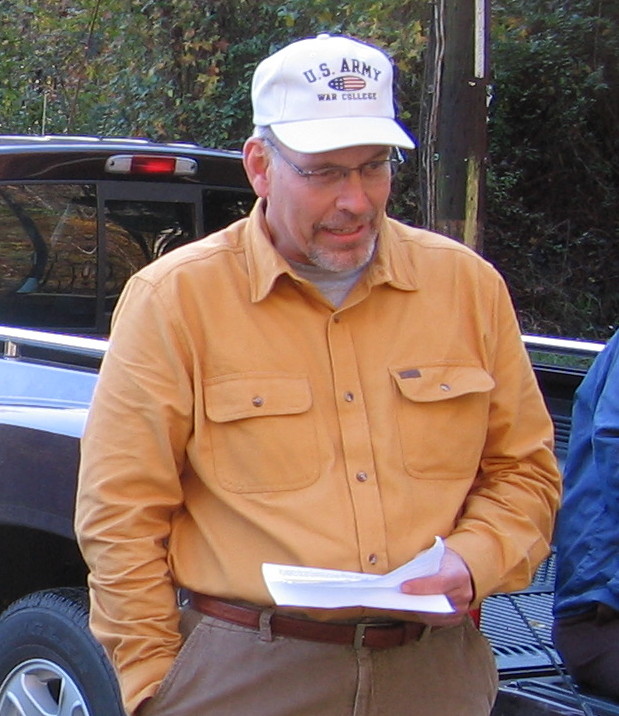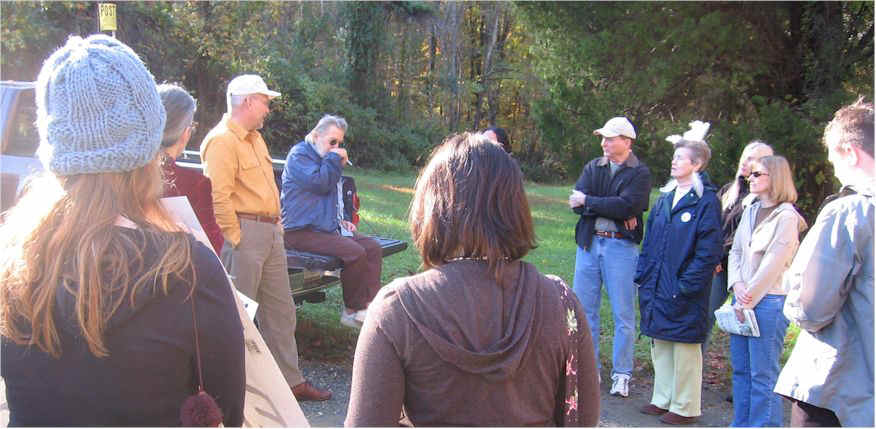

Long-time relic hunter, Glenn Trimmer (left) addresses Save Crow's Nest supporters and press at the front gates of Crow's Nest. He and other speakers stressed the importance of permanently protecting the peninsula.
(cont.) CITIZEN ACTION HELPS BRING RELIC HUNT TO A HALT
Questions
remain unanswered regarding the relic hunt but this seems certain: it was called
off after an outcry from local citizens. On
Friday morning October 27, Save Crow’s Nest (SCN) confirmed that over 150
relic hunters in more than 40 vehicles had converged on the
historically-significant and environmentally-sensitive Crow’s Nest peninsula
for the Grand National Relic Shootout (GNRS), a three-day contest that pits
relic hunting teams against each other.
SCN contacted County officials questioning the legality of the hunt
and alerted its members to the incursion on the much-disputed property.
These efforts sparked a flurry of activity. At first, the lawyer for the property owners denied there were relic hunters on Crow’s Nest, suggesting instead that it might be game hunters. After Save Crow’s Nest presented evidence to the contrary, the lawyer maintained that the owners knew nothing of this event and considered the relic hunters to be trespassing. He said a caretaker who had previously been employed to manage the property had signed a contract with the relic hunters without the authorization of the property owners. By the end of the day, the property owners requested that the Stafford County Sheriff intervene to evict the trespassing relic hunters. (See photos.)
 |

Long-time relic hunter, Glenn Trimmer (left) addresses Save Crow's Nest supporters and press at the front gates of Crow's Nest. He and other speakers stressed the importance of permanently protecting the peninsula. |
The
next day, at a press conference organized by Save Crow’s Nest, Glenn Trimmer a
long-time local relic hunter and co-founder of the Friends
of Stafford Civil War Sites put it simply: Crow’s Nest was “probably the
worst site [GNRS] could have picked” for a large-scale relic hunt.
Speaking at the same press conference, Save Crow’s Nest member, Cecelia
Kirkman, said, “I want to make clear that we are not ‘anti-relic hunter.’
We recognize that when governments fail to preserve historically significant
sites, relic hunters who act responsibly can play an important role in
preserving historical artifacts. Our beef is not with GNRS, and we extend an
open invitation to them to meet with us to set the record straight.”
Instead, Kirkman noted, anger over damage to the peninsula “needs to be
directed at K&M Properties, and the County…. We are here today because the
Board of Supervisors has not acted decisively to protect Crow’s Nest.”
Left
in the lurch through all of this were over 150 relic hunters who paid $200
apiece and traveled from all over the country to be part of the “Grand
National Relic Shootout.” The
weekend’s event had been planned for nearly a year and is conducted annually
at different locations. The GNRS
actions are so controversial that plans for the event are kept secret.
Participants are not even told the precise location of the “Shootout”
until the night before the event begins. Relic
hunters use metal detectors and other equipment to identify historic relics
buried in the ground. They then dig
holes or trenches to unearth whatever they can.
The relics are often sold. This particular event pits different teams
against each other to see who can unearth the greatest number of relics with the
greatest value. As if it were a
sporting event, trophies are awarded to “winners.”
Read
the local newspaper account, "Crow's
Nest relic hunt halted," along with a story about large
relic hunts.